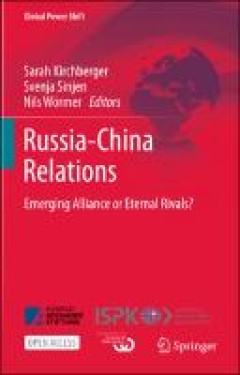Filter by

Russia-China Relations: Emerging Alliance or Eternal Rivals?
This open access book examines Russia-China relations across a variety of civilian and military areas of cooperation. Leading experts in the field present empirical case studies covering a wide range of strategic cooperation areas between Russia and China, such as technological, military, economic and political cooperation. The contributing authors shed new light on Chinese and Russian strategi…
- Edition
- Ed. 1
- ISBN/ISSN
- 9783030970123, 9783030970123
- Collation
- 315
- Series Title
- Global Power Shift
- Call Number
- 327 RUS r

Give peace a chance: on violence and warfare in prehistory and why it matters
How is it possible that people kill each other? And above all: how is it possible that people who are able to peacefully live with each other at one moment, can kill each other at another one? These are fundamental questions about the human condition – questions that religions, philosophers and scientists have been wanting to solve since times immemorial and that continue to fascinate us toda…
- Edition
- Ed. 1
- ISBN/ISSN
- 9789082948134
- Collation
- 65
- Series Title
- -
- Call Number
- 303.66 FAN g

Money Matters: Addressing the Financial Sustainability of Security Sector Reform
Although the financial sustainability of United Nations (UN) support to institutional capacity building in post-conflict contexts may be the least analysed topic on the peacebuilding agenda, understanding the costs of rebuilding and maintaining the security sector should be one of the most important priorities for security sector reform (SSR) practitioners today. Through innovative partnerships…
- Edition
- Ed. 1
- ISBN/ISSN
- 9781911529385
- Collation
- 35
- Series Title
- SSR Papers, 11
- Call Number
- 320 KEA m

The "Democratic Soldier": Comparing Concepts and Practices in Europe
Since the end of the Cold War almost all European countries have reformed their armed forces, focusing on downsizing, internationalization and professionalization. This paper examines how these changes in security sector governance have affected the normative model underlying the militaryâ s relationship to democracy, using the image of the â democratic soldierâ . Drawing on a comparative an…
- Edition
- Ed. 1
- ISBN/ISSN
- 9781911529361
- Collation
- 64
- Series Title
- SSR Papers, 9
- Call Number
- 320 MAN d

Towards an International Code of Conduct for Private Security Providers: A Vi…
The use of private security companies (PSCs) to perform services that are traditionally associated with the state presents a challenge to regulatory and oversight frameworks. Analyzing developments leading to the International Code of Conduct for Security Providers (ICOC) and the ICOC Association, this paper argues that a multistakeholder approach to develop standards adapted for the private se…
- Edition
- Ed. 1
- ISBN/ISSN
- 9781911529392
- Collation
- 61
- Series Title
- SSR Papers, 12
- Call Number
- 320 BUZ t
 Computer Science, Information & General Works
Computer Science, Information & General Works  Philosophy & Psychology
Philosophy & Psychology  Religion
Religion  Social Sciences
Social Sciences  Language
Language  Pure Science
Pure Science  Applied Sciences
Applied Sciences  Art & Recreation
Art & Recreation  Literature
Literature  History & Geography
History & Geography